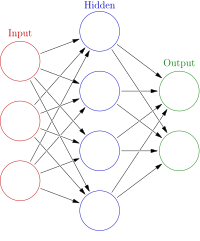
Photo from wikipedia
The purpose of this research is to emphasize the importance of mental health and contribute to the overall well-being of humankind by detecting stress. Stress is a state of strain,… Click to show full abstract
The purpose of this research is to emphasize the importance of mental health and contribute to the overall well-being of humankind by detecting stress. Stress is a state of strain, whether it be mental or physical. It can result from anything that frustrates, incenses, or unnerves you in an event or thinking. Your body’s response to a demand or challenge is stress. Stress affects people on a daily basis. Stress can be regarded as a hidden pandemic. Long-term (chronic) stress results in ongoing activation of the stress response, which wears down the body over time. Symptoms manifest as behavioral, emotional, and physical effects. The most common method involves administering brief self-report questionnaires such as the Perceived Stress Scale. However, self-report questionnaires frequently lack item specificity and validity, and interview-based measures can be time- and money-consuming. In this research, a novel method used to detect human mental stress by processing audio-visual data is proposed. In this paper, the focus is on understanding the use of audio-visual stress identification. Using the cascaded RNN-LSTM strategy, we achieved 91% accuracy on the RAVDESS dataset, classifying eight emotions and eventually stressed and unstressed states.
Journal Title: Bioengineering
Year Published: 2022
Link to full text (if available)
Share on Social Media: Sign Up to like & get
recommendations!